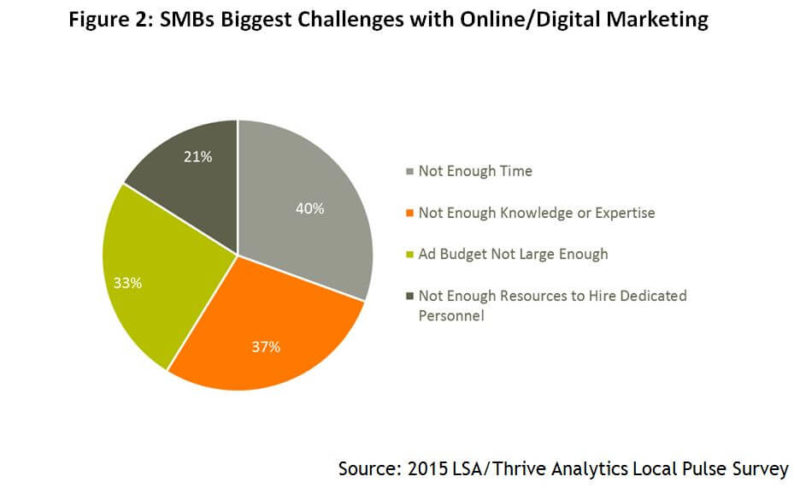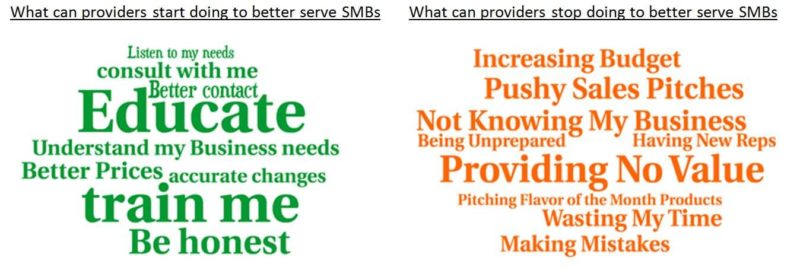Search: The Best Way To Win An SMB’s Heart
Columnist Wesley Young notes that, according to recent survey by the Local Search Association, search engine optimization (SEO) is one of the greatest areas of concern for small and medium-sized businesses.

In data pulled from Local Search Association’s (LSA) Mobile Fanatics report, search engines and mobile search ranked 1st and 3rd (respectively) as sources that were extremely likely to be used to find local businesses, products or services. No surprise there.
But search is also the area that small and medium-size businesses most need help with, according to new data released in LSA’s Local Pulse Survey, conducted by Thrive Analytics.
Over one thousand small and medium-sized businesses (SMBs) were surveyed this year to gauge their attitudes about the economy, what they are doing with their marketing budgets, what role social and digital media are playing in generating leads for them, and how satisfied they are with their providers.
The below chart summarizing data from the survey reveals where small businesses need the most help. It’s segmented by the age of the business.
SEO ranked first, or in a dead heat for first, of the areas SMBs most desire help in by all companies except for the most mature (in business for more than 15 years).
In most instances, SEO ranked first by a large margin. We witnessed this in practice as well at LSA’s SMB digital boot camp, attended by over 100 L.A. area local businesses in April, where discussion and questions usually circled back to those factors affecting SEO.
Thus, agencies need to recognize that if they are not providing SEO-related help to clients as part of their services, there is a good chance the clients feel their most important need is not being met.
One way to provide immediate SEO dividends for an SMB client is to ensure its website is mobile responsive or mobile friendly. A full 60% of SMBs in the Local Pulse study said their websites were not optimized for mobile.
Google’s new mobile friendly ranking algorithm released in April 2015 means marketers can kill two birds with one stone by helping transition to a mobile website that helps boost SEO under the new formula, while also taking the first step towards mobile advertising and marketing solutions.
The chart in Figure 1 also shows some interesting trends related to the differing priorities held by businesses at different stages of growth, which speaks to the need for agencies or marketing companies to evolve their services as their clients’ businesses mature.
For example, creation of online content is critical to new companies that are less than a year old, but interest in that service drops off dramatically after the first year.
This trend is supported by other data in the Local Pulse study — 56% of small business owners only update their website every 6 months or less, 65% of business listings are updated quarterly, and 55% of social media pages are updated monthly or less.
The practice of infrequent content updates by SMBs may be due to the misguided belief that content is a static asset. At the minimum, there is a misunderstanding of the value of fresh and engaging content to customers — and even to the business owners’ expressed priority, SEO.
The Local Pulse study revealed that 37% of small businesses felt their biggest challenge with online or digital marketing was they did not have enough knowledge or expertise. Along these lines, 40% did not have enough time and 21% did not have resources to have dedicated staff manage the marketing.
However, just because a business owner doesn’t have the time or knowledge to manage their own marketing doesn’t mean that they don’t want to learn how it works. That seems to be the mistake many marketers are making, as demonstrated in the word clouds below.
Since Figure 2 shows that only 33% of SMBs state their biggest challenge with digital or online marketing is lack of sufficient ad budget, it appears that most SMBs have the means and will pay for education and training.
By better understanding the marketplace and advertising products, SMBs will realize where they need help and feel more comfortable purchasing other services such as content creation and mobile marketing.
Further, SMBs are planning on increasing their spending on marketing and/or advertising and will increase the number of media types in their marketing efforts.
The above charts from the 2013-2015 Local Pulse Surveys show that SMBs plan on increasing spending this year on marketing and advertising by 27% compared to 2013 and by almost 17% compared to last year as they budget 14% of all expenses to marketing and advertising in 2015. On average, every SMB will also use at least one more media type for marketing than it did in 2013.
So SMBs will be open to spending more and trying new things. Marketers can expect existing clients to be receptive to new products and services. It is also possible to secure new clients without necessarily competing with existing marketing contracts SMBs may already have in place.
Boutique firms may offer specialty services that add to or complement current marketing plans. And there should be plenty of opportunities to find SMBs looking for help. You just have to understand what they are looking for.
Takeaways
- Marketing and advertising needs differ widely based on many factors, but one important factor that should be considered is the age of the business.
- Help with SEO, however, appears to be highly desired regardless of the maturity of the business.
- Google’s new algorithm means making websites mobile friendly is a high return strategy that should satisfy client priorities, provide demonstrable ROI, and open the door for new marketing products and services.
- SMBs are committing to significant increases in marketing budgets and are interested in new media outlets.
- SMBs want to be educated and trained on marketing strategy and solutions, not just sold on them.
- Those partners who can grow with the SMB and adjust to its changing marketing needs will be the most successful in retaining long term clients.
Contributing authors are invited to create content for Search Engine Land and are chosen for their expertise and contribution to the search community. Our contributors work under the oversight of the editorial staff and contributions are checked for quality and relevance to our readers. The opinions they express are their own.
Related stories
New on Search Engine Land



